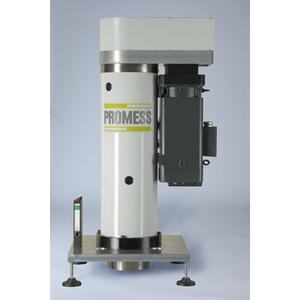This new Promess press was introduced to meet the needs of an automotive supplier specialized in steering and chassis systems
This press is used for the assembly of ball joints in its Czech factory. In addition to a nominal force of 500 kN, it has a stroke of 400 mm with a nominal speed of 200 mm / s maximum. Like all our Servo motors this model has very robust mechanical design included: self-guarding case, ball screw, force sensor, drive belt, brushless servo motor.
The application provides for pressing a stabilizer in a ball bearing and crimping it to prevent the stabilizer from escaping. The assembly of ball joints is completely automated. The elements are brought by turntable. The cycle time is 8 sec. The stabilizer must be held while the ball bearing is crimped.
To maintain the stabilizer from below it is sufficient to use a small force, but for the crimping of the support a high force of 260 to 280 kN is required depending on the diameter of the ball. These requirements require reproducible fastening forces to guarantee the assembly quality. This is the advantage of the PROMESS UFM Servopresses. They have real-time force-to-distance control at each cycle for total quality.
The evaluation of the process data is carried out by editing different values ??measured by the Profibus as well as by archiving in the PROMESS database.
The OK and NOK evaluation is performed by window and envelope values. In a pilot test at PROMESS, it was possible to reproduce the embedding effort documented by the superposition of the curves in the database for 12 diversities of ball joints. The lifetime was optimized and the requested cycle time was achievable.
This press is used for the assembly of ball joints in its Czech factory. In addition to a nominal force of 500 kN, it has a stroke of 400 mm with a nominal speed of 200 mm / s maximum. Like all our Servo motors this model has very robust mechanical design included: self-guarding case, ball screw, force sensor, drive belt, brushless servo motor.
The application provides for pressing a stabilizer in a ball bearing and crimping it to prevent the stabilizer from escaping. The assembly of ball joints is completely automated. The elements are brought by turntable. The cycle time is 8 sec. The stabilizer must be held while the ball bearing is crimped.
To maintain the stabilizer from below it is sufficient to use a small force, but for the crimping of the support a high force of 260 to 280 kN is required depending on the diameter of the ball. These requirements require reproducible fastening forces to guarantee the assembly quality. This is the advantage of the PROMESS UFM Servopresses. They have real-time force-to-distance control at each cycle for total quality.
The evaluation of the process data is carried out by editing different values ??measured by the Profibus as well as by archiving in the PROMESS database.
The OK and NOK evaluation is performed by window and envelope values. In a pilot test at PROMESS, it was possible to reproduce the embedding effort documented by the superposition of the curves in the database for 12 diversities of ball joints. The lifetime was optimized and the requested cycle time was achievable.
